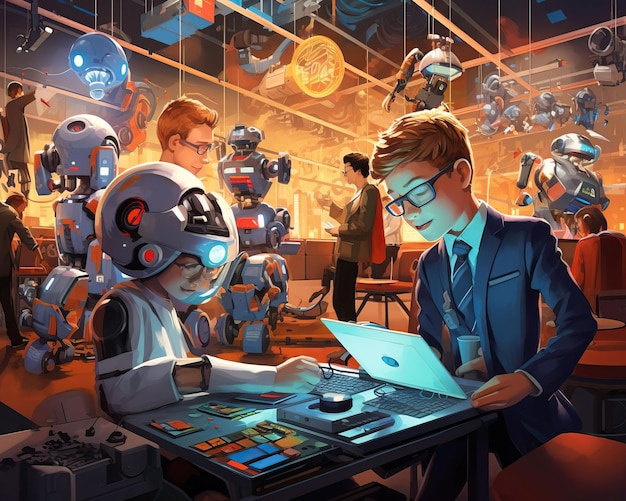Quick Read
Exploring the Magic of Assistant: Your AI Friend
In today’s fast-paced world, time is a precious commodity. To help us manage our daily tasks and save valuable minutes, we turn to digital assistants. One such assistant that has been making waves in the tech world is Assistant. This advanced AI is designed to make your life easier, more productive, and just a little bit more fun.
What Is Assistant?
Assistant is a versatile artificial intelligence designed to assist users with an extensive range of tasks. From setting reminders and managing schedules to answering queries and controlling smart home devices, Assistant is always ready to lend a helping hand. Powered by advanced machine learning algorithms, this ai continually learns and adapts to user behavior, making it an invaluable companion in both personal and professional settings.
Key Features of Assistant
- Natural Language Processing: Assistant can understand and respond to spoken or written queries, making communication seamless and intuitive.
- Multitasking: Assistant can handle multiple tasks simultaneously, ensuring that your to-do list stays manageable.
- Integration with Smart Devices: Assistant can control various smart home devices, such as lights, thermostats, and security systems.
- Continuous Learning: Assistant continually learns from user interactions, improving its capabilities over time.
Artificial Intelligence (AI), a branch of computer science that aims to create machines capable of intelligent behavior, is revolutionizing the way businesses operate across various industries. From
Healthcare
and
Finance
to
Retail
and
Manufacturing
, ai is transforming processes, enhancing productivity, and improving customer experience. For instance, in healthcare, AI-powered systems are being used for
diagnosis
,
treatment recommendations
, and even
patient monitoring
. In finance, AI is being employed for risk assessment, fraud detection, and investment analysis. The retail industry is leveraging AI for personalized marketing, inventory management, and customer service. In manufacturing, AI is being used for predictive maintenance, quality control, and optimizing production.
As we move into the next decade, it is crucial for professionals to understand the future trends and predictions for AI careers. According to a report by Stanford University, there will be an
exponential growth in jobs requiring AI skills
in the next few years. This presents a significant opportunity for professionals looking to upskill and stay ahead of the curve. Some of the
emerging AI careers
include:
AI Engineer:
Data Scientist:
Machine Learning Engineer:
AI Ethicist:
responsible for designing, implementing, and maintaining AI systems.
who use statistical methods to extract insights from large datasets, many of which are used to train AI models.
who build and deploy machine learning models and applications.
who focus on the ethical implications of AI, such as privacy concerns and bias.
In conclusion, Artificial Intelligence is having a profound impact on various industries and will continue to do so in the coming years. As the demand for AI skills grows exponentially, it’s essential for professionals to stay informed about emerging trends and careers to position themselves for success in this exciting field.
Current State of AI Careers: Innovations and Opportunities
In the present day, the field of Artificial Intelligence (AI) is experiencing an unprecedented surge in interest and investment. The rapid advancement of technology has opened up a multitude of opportunities for professionals seeking to make their mark in this exciting domain. According to the Stanford Artificial Intelligence Index, the number of AI-related papers published between 1956 and 2018 grew from 60 in 1971 to over 30,000 in 2018, illustrating the significant growth of research and development in AI. This expansion is also reflected in the job market, with LinkedIn‘s 2019 Emerging Jobs Report ranking “Artificial Intelligence Specialist” as the number one emerging job, and “Machine Learning Engineer” among the top five.
Promising Subfields
Within the broad field of AI, several subfields are particularly attractive for professionals. Machine Learning, a subset of AI that involves teaching computers to learn from data, is one such area. According to Glassdoor’s 2019 list of Best Jobs in America, “Machine Learning Engineer” ranks as the number one job in terms of salary and job satisfaction. Another subfield experiencing significant growth is Natural Language Processing (NLP), which focuses on enabling computers to understand and process human language. NLP is the driving force behind many popular AI applications, including virtual assistants like Siri and Alexa.
Key Skills
To succeed in an AI career, professionals need to have a solid foundation in mathematics and programming, as well as specialized knowledge in the field. Statistical analysis, probability theory, and linear algebra are essential skills for machine learning. Familiarity with programming languages like Python, R, or MATLAB is also necessary. Additionally, a deep understanding of the underlying algorithms and architectures used in AI systems is crucial for developing innovative solutions. Soft skills, such as problem-solving ability, creativity, and effective communication, are also highly valued.
Outlook and Challenges
The future of AI careers looks bright, with continued innovation and growth expected. However, the field also presents numerous challenges. Ethical considerations surrounding issues like data privacy, bias, and job displacement are becoming increasingly important. Ensuring that AI systems are transparent, trustworthy, and fair will be a critical responsibility for professionals in the field. Additionally, keeping up with the latest research and developments can be a significant challenge. Staying informed through professional networks, attending conferences, and engaging in ongoing learning will be essential for success.
Conclusion
AI careers offer a wealth of opportunities for professionals seeking to make a significant impact in the technology industry. With its vast potential to revolutionize various industries and improve our daily lives, AI is an exciting and dynamic field that promises endless possibilities for innovation and growth.

Overview of AI Careers:
The current landscape of Artificial Intelligence (AI) careers is dynamic and ever-evolving. With the increasing adoption of AI technologies across various industries, there’s a growing demand for skilled professionals. Popular job titles include Data Scientist, Machine Learning Engineer, Natural Language Processing (NLP) Specialist, Robotics Engineer, and Computer Vision Engineer.
Growth Rate of AI-Related Jobs:
The growth rate of AI-related jobs is remarkable. According to a report by the World Economic Forum, there will be an estimated 2.3 million new jobs created in AI and related fields between 2018 and 202This represents a 45% increase from the number of related jobs in 2018.
Demand for Skilled Professionals:
The demand for skilled professionals in AI-related fields is significant. Companies across industries are investing in AI technologies to streamline operations, improve customer experiences, and gain a competitive edge. This demand is driven by advancements in machine learning, deep learning, natural language processing (NLP), computer vision, and robotics.
Current Challenges and Limitations:
Despite the promising future of AI careers, there are challenges and limitations that must be addressed. One significant challenge is the ethical use of AI technologies. Ensuring transparency, fairness, and accountability in AI systems is crucial to maintain public trust and prevent potential negative consequences.
Another challenge lies in the limited availability of skilled professionals in AI-related fields. As more companies invest in these technologies, the competition for top talent intensifies. To address this challenge, organizations are investing in training and education programs to develop a pipeline of skilled professionals.
Lastly, there are technical limitations that need to be addressed for AI technologies to reach their full potential. These include challenges in areas like data quality, data privacy, and scalability. Addressing these limitations will require a multidisciplinary approach involving experts from various fields, including computer science, mathematics, ethics, and policy.
I Trends in AI Careers
Artificial Intelligence (AI) is transforming the job market, creating new opportunities and reshaping existing roles. According to a Gartner report, by 2025, the global economy will create over 3 million new jobs in AI and related fields.
Machine Learning Engineers
are currently at the top of the list when it comes to AI careers due to their ability to design and implement machine learning systems. With a median salary of over $130,000 per year, they are among the highest-paid professionals in tech.
Data Scientists
are also in high demand, as they play a crucial role in gathering and analyzing data that drives AI systems.
Deep Learning Engineers
are another emerging role, responsible for designing and building deep learning models, which are the most advanced form of AI.
Natural Language Processing (NLP) Engineers
are another group of professionals who are highly sought after, given the increasing importance of AI in areas like customer service and content moderation.
AI Ethicists
are a new type of role that is gaining prominence as AI becomes more ubiquitous. They help shape ethical guidelines for the development and deployment of AI systems, ensuring they are fair, transparent, and unbiased. Lastly,
AI Sales and Marketing Professionals
are also essential as they help businesses understand how to best utilize AI technology. With the ongoing growth of AI, there is no shortage of opportunities for professionals with diverse backgrounds and skill sets.

AI Specialization, Cross-functional Roles, and Automation
Artificial Intelligence (AI) is a rapidly evolving field with numerous applications that require deep expertise in specific domains. Some of the most prominent AI applications include Natural Language Processing (NLP), Computer Vision, Machine Learning, and Robotics.
Specialization in Specific AI Applications
Each of these applications presents unique challenges and opportunities. For instance, NLP involves developing algorithms that can understand and generate human language, whereas Computer Vision focuses on interpreting and analyzing visual data. Machine Learning, on the other hand, deals with creating algorithms that can learn from data to make predictions or decisions without explicit instructions. Robotics encompasses designing, constructing, and programming robots to perform tasks autonomously.
Importance of Deep Expertise in Specific AI Domains
The importance of deep expertise in specific AI domains cannot be overstated. By specializing in a particular area, professionals can develop the necessary skills and knowledge to make significant contributions. Moreover, domain-specific expertise enables them to understand complex problems and devise effective solutions.
Cross-functional Roles that Require Both Technical and Business Skills
However, the AI industry also requires professionals with a strong foundation in both technical and business aspects of AI. Such cross-functional roles include Data Scientist, AI Product Manager, and AI Ethicist.
Cross-functional Roles: Understanding Both Technical and Business Aspects of AI
Data Scientists, for example, are responsible for using data to develop AI models and applications. They need a solid understanding of machine learning algorithms, statistical analysis, data visualization tools, and programming languages like Python and R. Additionally, they must have excellent communication skills to collaborate with stakeholders and present their findings effectively.
AI Product Managers serve as the bridge between the technical team and the business side of an organization. They need to understand both the technology and the market to create successful AI products. Their role involves defining product strategy, prioritizing features, managing the development process, and working closely with designers and engineers.
AI Ethicists focus on ensuring that AI is developed and used ethically, responsibly, and transparently. They require a deep understanding of ethical principles, moral philosophy, and societal implications of AI. Furthermore, they should be familiar with relevant regulations and standards to promote trust and confidence in AI systems.
The Increasing Role of Automation in AI Careers
With the increasing use of automation, there is ongoing debate about its impact on various roles within the AI industry. While some jobs may become obsolete, new positions will emerge that require different skill sets.
Automation and the Job Market
Automation is expected to impact jobs in areas like data entry, customer service, and manufacturing. However, it also creates opportunities for professionals in fields like machine learning engineering, data science, and robotics.
Opportunities and Challenges
For professionals in the AI industry, it is essential to stay informed about emerging technologies and trends. They must be willing to adapt and learn new skills continually. Additionally, they should embrace the opportunities presented by automation while mitigating any potential challenges.
Predictions for AI Careers in the Next Decade
Artificial Intelligence (AI) is no longer a futuristic concept; it has become an integral part of our daily lives. From Siri and Alexa guiding us through our day to autonomous vehicles and
advanced robotics
revolutionizing industries, AI is here to stay. As we step into the next decade, the AI industry is expected to grow exponentially, creating a multitude of opportunities for professionals. Here are some
predictions for AI careers in the next decade:
Data Scientist and Engineers
The demand for data scientists and engineers who can develop, implement, and maintain AI systems is on the rise. With machine learning algorithms becoming increasingly complex, the need for skilled professionals to create, manage, and improve these systems is more critical than ever.
Ethical AI Specialists
As AI becomes more prevalent in society, the need for individuals who can ensure that these systems are ethical, transparent, and unbiased is growing. Ethical AI specialists will work to create guidelines, policies, and frameworks to ensure that AI systems are used in a responsible manner.
Healthcare Professionals
The healthcare industry is expected to see significant growth in AI applications, from diagnostics and treatment planning to patient care and monitoring. Healthcare professionals with a background in AI will be in high demand as they will play a crucial role in implementing these systems and ensuring they are effective and efficient.
Educators and Trainers
As AI becomes more integrated into the workforce, there will be a growing need for educators and trainers to help employees adapt to these changes. Professionals with expertise in AI and education will have the opportunity to create training programs, develop curricula, and teach new skills.
5. Cybersecurity Professionals
With the increased use of AI comes an increased risk of cyberattacks. Cybersecurity professionals with expertise in AI will be essential to protect these systems from threats and vulnerabilities. They will need to develop strategies to secure AI infrastructure, detect and prevent attacks, and respond to incidents.
6. Creative Professionals
AI is also making an impact on creative industries, from graphic design and music composition to writing and journalism. Professionals with a background in AI and creativity will have the opportunity to push the boundaries of what is possible, collaborating with AI systems to produce innovative works.
7. Policy Makers and Regulators
As AI becomes more prevalent in society, there will be a growing need for policymakers and regulators to create frameworks and guidelines to ensure that these systems are used responsibly. Professionals with expertise in AI, law, and policy will be essential to create regulations that balance innovation and privacy concerns while ensuring fairness and transparency.
These are just a few of the many careers that are expected to emerge in the AI industry in the next decade. With the rapid pace of innovation and development, it’s an exciting time to be a part of this field.

The Future of Work: Impact, Ethics, and Continuous Learning
Impact on the Labor Market and Employment Trends
Artificial Intelligence (AI) is revolutionizing industries and transforming the way we work. While this technological shift presents opportunities for new jobs and industries, it also raises concerns about potential job losses due to automation. According to a report by McKinsey & Company, up to 800 million jobs could be lost globally by 2030 due to automation and AI adoption. However, it’s essential to recognize that these advances will also create new opportunities. For instance, jobs related to data analysis, programming, and maintenance of AI systems are expected to grow.
Potential Job Losses and Gains
Industries such as manufacturing, transportation, and customer service are most susceptible to automation, with up to 25% of jobs in these sectors at risk. On the other hand, sectors like healthcare and education are expected to experience job growth due to the increasing demand for human skills such as compassion, creativity, and critical thinking.
Ethical Considerations and Societal Impact
The adoption of AI raises ethical concerns across various industries, particularly in areas such as healthcare, finance, and law enforcement. For instance, the use of AI for facial recognition or predictive policing has been criticized for potential biases and privacy concerns. Furthermore, the use of AI in decision-making processes can lead to ethical dilemmas, such as the question of who is responsible for the consequences of an AI’s actions.
Ethical Implications and Regulations
To address these concerns, various regulations, policies, and initiatives have been proposed. For instance, the European Union’s General Data Protection Regulation (GDPR) aims to protect individuals’ privacy rights in the digital age. Similarly, the Ethics Guidelines for Trustworthy AI, developed by the European Commission, provide a framework for ethical AI design and deployment.
The Importance of Continuous Learning and Upskilling
In an ever-changing AI landscape, it is crucial for professionals to adapt and upskill. With new technologies emerging constantly, professionals must be willing to learn throughout their careers. This includes acquiring technical skills related to AI and data analysis as well as soft skills, such as creativity, critical thinking, and communication.
Staying Updated and Relevant
Professionals can stay updated on the latest AI trends through various resources, such as online courses, webinars, and industry events. They can also seek out mentors or join professional organizations to expand their network and learn from peers. Lastly, engaging in lifelong learning not only helps individuals remain competitive but also contributes to the overall growth of their organizations and industries.
Conclusion
As we’ve explored throughout this essay, the impact of artificial intelligence (AI) on our society is a complex and multifaceted issue. From its potential to revolutionize industries and improve productivity, to the ethical concerns surrounding privacy and job displacement, AI is a topic that demands our attention. While some may be quick to herald the arrival of a new era of technological progress, it’s important that we also consider the potential risks and challenges that come with this advancement.
Productivity and Efficiency
One of the most promising aspects of AI is its ability to increase productivity and efficiency in a wide range of industries. From manufacturing and logistics, to healthcare and education, AI has the potential to streamline processes and improve outcomes. For example, in manufacturing, AI-powered robots can work around the clock without breaks, leading to significant cost savings and increased production. Similarly, in healthcare, AI-powered diagnostic tools can help doctors identify diseases faster and more accurately, leading to better patient outcomes.
Ethical Concerns
However, the potential benefits of AI are not without their challenges. One of the most pressing ethical concerns is the impact on employment. As AI becomes more capable of performing tasks traditionally done by humans, there’s a risk that many jobs could become obsolete. This raises questions about what role humans will play in the workforce of the future and how we can ensure that people are not left behind. Additionally, there’s the issue of privacy and security. With AI systems collecting and analyzing vast amounts of data, there’s a risk that personal information could be compromised or misused.
Moving Forward
Despite these challenges, there are steps we can take to ensure that AI is used in a responsible and ethical manner. For example, governments and businesses could invest in education and training programs to help workers develop the skills they need to adapt to the changing job market. Additionally, there could be regulations put in place to protect privacy and security, such as data protection laws and ethical guidelines for AI development.
The Future is Bright
In conclusion, the impact of AI on our society is a complex and nuanced issue. While there are certainly challenges and ethical concerns that need to be addressed, there’s also the potential for tremendous benefits in terms of productivity, efficiency, and innovation. By working together to address these challenges and seize the opportunities presented by AI, we can ensure that this technology is used in a way that benefits everyone.

Key Trends, Predictions, and Implications for AI Careers in the Next Decade
The next decade is expected to bring significant changes to the field of Artificial Intelligence (AI) and its related careers. Firstly, the demand for AI professionals is projected to grow rapidly, with the global market size expected to reach $291.4 billion by 2027. According to a report by Gartner, AI job roles are expected to increase by 54% through 2022.
Specific Roles and Skills in Demand
Secondly, certain roles will be more in demand than others. “Data scientists, machine learning engineers, and AI specialists are expected to be the most sought-after professionals,” states a report by Burning Glass Technologies. Moreover, soft skills, such as creativity, problem solving, and communication, will become increasingly important to complement technical expertise.
Impact on Various Industries
Thirdly, AI is set to impact various industries significantly. Healthcare, finance, education, and manufacturing are some sectors expected to experience the greatest transformation due to AI integration. Fourthly, there will be a shift towards more ethical and transparent AI, with a focus on maintaining user privacy and ensuring fairness.
Predictions and Future Developments
Fifthly, advancements in AI research, such as quantum computing, human-robot collaboration, and deep learning, will create new opportunities for professionals.
Quantum Computing
could lead to more sophisticated AI algorithms, while
human-robot collaboration
will require professionals skilled in managing these relationships.
Implications for Individuals and Organizations
Sixthly, individuals and organizations must be prepared to adapt to these changes. Lifelong learning, continuous skill development, and a willingness to embrace new technologies will be essential. Additionally, organizations must ensure their workforce is AI-ready by investing in training programs and creating an inclusive culture.
Final Thoughts
Lastly, it’s crucial for professionals to be proactive and take control of their career paths. “Stay informed about the latest trends, engage with industry experts, and seek out opportunities for learning and growth,” suggests an article in Forbes. By doing so, individuals will be well-positioned to succeed in the evolving landscape of AI careers.
